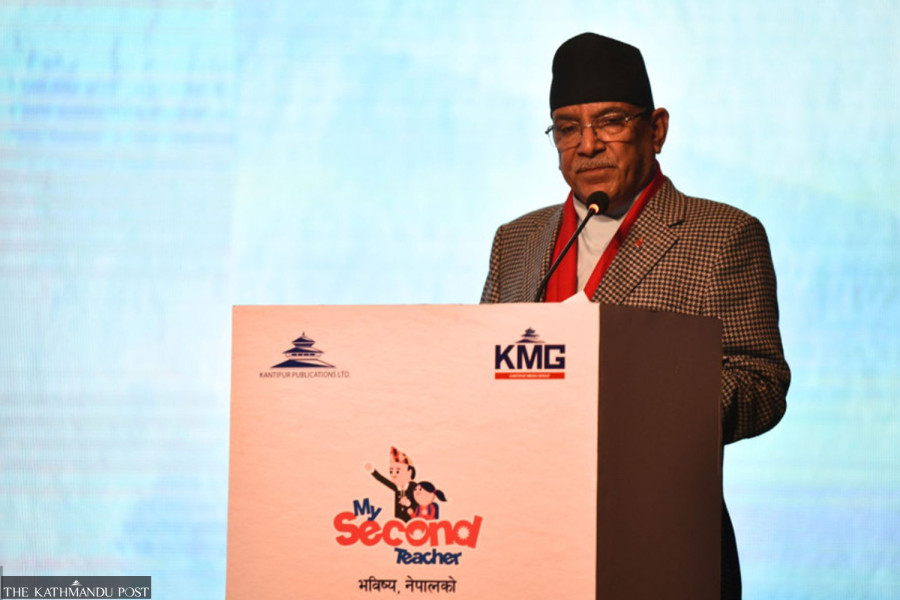National
Prime minister commits to better university education
For that, law is necessary to strip political leadership of its powers at universities.
Post Report
Amid increasing criticism that over-politicisation has ruined the country's higher education, Prime Minister Pushpa Kamal Dahal has claimed that the law is being formulated to appoint independent personalities as university chancellors. At present, the prime minister is the chancellor of most Nepali universities, while professors govern the institutions as the vice-chancellors.
Dahal, who is the ex-officio chancellor, said the measure was being taken to restore public trust in the country’s higher education. Delivering the inaugural address at the Kantipur Education Summit in the Capital on Tuesday, Dahal said it was neither practical nor appropriate for the prime minister to become the vice-chancellor of all the universities.
“We have started discussions to appoint academic people and experts as the chancellor of the universities,” he said, stating that the government had already made necessary preparations for an integrated higher education bill. The prime minister is not the chancellor only in a few newly established universities. The education minister is the pro-chancellor. The prime minister picks one of the three candidates selected by the education minister-led search committee as the vice-chancellor of the universities.
For years, educationists have spoken against the provision of having the prime minister as the chancellor. They argue that a board of trustees composed of the nation’s eminent personalities should have the authority to manage the universities, not the prime minister and education ministers.
As the authority for the appointments rests on the prime minister, the vice-chancellors, who are the executive head of the universities, are being appointed on political sharing. This, according to the educationists, is the root cause of the downfall in quality at the university level.
Addressing the summit, Dahal said he was for the introduction of a meritocratic recruitment process at all levels of higher education. “There will not be politicisation in universities anymore. Officials like the vice-chancellor and other administrators will be recruited on the basis of merit. This will open doors for deserving candidates,” Dahal said.
He further stated that although improvements had been made in the education system and structure following the establishment of a federal democratic government, it has been proven insufficient. Addressing the growing tendency of students to opt for studies abroad, the prime minister said there was a need to review the existing education system.
“In recent times, a negative notion has grown among students that the country’s education is not of high quality and [they] cannot compete on the global stage. Its direct result is the exodus of skilled manpower,” Dahal said.
Education experts say it would be a great step towards improving the university if Dahal lived up to his commitment to replacing the prime minister with an expert as university chancellor and appointing vice-chancellors on meritocracy.
Kamal Krishna Joshi, a former chairperson of the University Grants Commission, said attempts to promulgate the higher education bill have been going on for over two decades now but the law hasn’t been passed yet.
“The law is not final because the government is unwilling to give up the roles of the political leadership at the universities,” he said. “As long as the prime minister … continues to become the chancellor, political influence is inevitable.”
The Ministry for Education, Science and Technology first sent the higher education bill to the Ministry of Law, Justice and Parliamentary Affairs for consultation. The law ministry returned it saying that consultation was necessary.
“We had finalised the draft but it needs to be revisited following the law ministry’s suggestion,” Shree Prasad Bhattarai, joint secretary at the education ministry, told the Post. “Feedback on the bill will be collected from the stakeholders before giving it a final shape.”
Education experts say a lot has been spoken on improving higher education, but that speech makes no sense if it is not translated into action.
Though Dahal was serious about improving university education, his government has left Tribhuvan University, with over 450,000 students, at the hands of an acting vice-chancellor for two months now. Dr Dharma Kant Banskota retired as the vice-chancellor in the first week of November but Dahal is reluctant to appoint his successor. Shiva Lal Bhusal has been leading the TU as the acting vice-chancellor. The absence of a vice-chancellor, who holds executive authority to govern the university, affects several academic and administrative decisions, which ultimately hamper the education calendar.
“It is already late to act to improve the university education. Mere words will not bring any changes,” said Joshi. “So far there are no signs of positive change.”




 14.24°C Kathmandu
14.24°C Kathmandu














